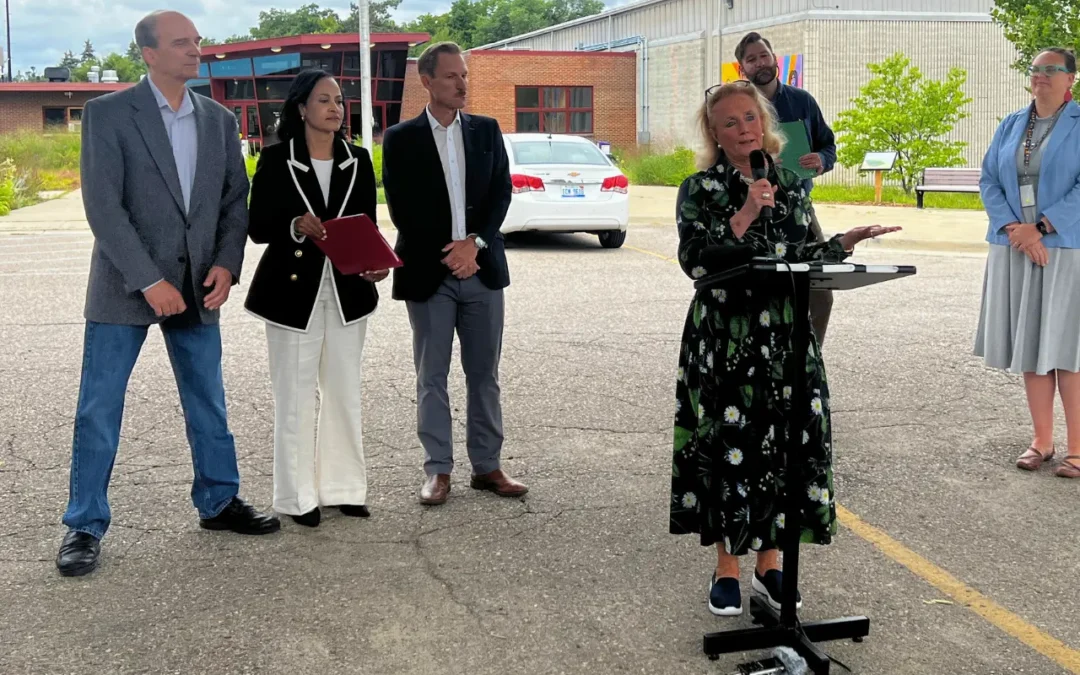
Federal funding from the Biden-Harris administration’s Bipartisan Infrastructure Law is helping Michigan companies expand their operations and create hundreds of new jobs.
MICHIGAN—Four Michigan-based companies are set to receive $355 million in federal grant funding to help expand the manufacturing of batteries for electric vehicles and renewable energy storage—and create or retain nearly 1,000 manufacturing jobs in the process.
Gov. Gretchen Whitmer and officials at the US Department of Energy announced the federal funding this month, which they say marked the largest single investment that the state of Michigan has received through the Biden-Harris administration’s Bipartisan Infrastructure Law.
“Michigan is leading the future of clean energy and competing to bring manufacturing jobs and supply chains back home,” Whitmer said in a statement announcing the funding on Friday afternoon. “With this historic funding from the Biden-Harris administration and our congressional delegation, we are expanding our production of batteries for electric vehicles and clean energy storage, solidifying our position as a leader in advanced manufacturing and clean energy.”
Here’s the Deal:
The Biden-Harris administration’s clean energy plan, which includes legislation like the Inflation Reduction Act and the Bipartisan Infrastructure Law, has fueled billions of dollars in clean energy investments across the United States, including in electric vehicle manufacturing.
All told, that legislation has led to the announcement of at least 84,000 new manufacturing jobs nationwide—including $27 billion in funding in Michigan to support 22,000 new jobs statewide.
The latest funding will only add to that total and enable four Michigan-based companies to expand, create nearly 2,000 new jobs—including the temporary construction jobs needed to build the new manufacturing facilities—and retain more than 400 existing positions.
State officials expect the four projects will also spur battery and advanced manufacturing across Michigan, strengthen the state’s energy independence, create other “good-paying, middle-class jobs,” and enable the state to transition to 100% renewable energy production by the year 2050.
“We will continue to compete for and win federal funding to build on our momentum, add to the 40,000 auto jobs we have already secured since I took office, and keep leading the future of advanced manufacturing,” Whitmer said in a statement last week. “Let’s get it done.”
What are the four projects?
Revex Technologies in Houghton will receive $145 million from the US Department of Energy and up to $50 million from the Make it in Michigan Competitiveness Fund to construct three facilities in Marquette, create 115 new jobs, retain 425 jobs, and support 360 construction jobs.
The project will enable the company to turn metal-bearing waste streams, mine tailings, and spent batteries into valuable materials, according to a project summary from state officials.
Mitrachem will receive $100 million from the US Department of Energy and up to $25 million in state incentives to build a facility in Muskegon to develop lithium iron phosphate for the manufacturing of at-home energy storage systems, as well as for electric vehicles.
The project will create 154 new jobs, as well as support 625 construction jobs. And once it’s finished, the facility will supply battery materials for over 300,000 EVs a year, state officials said.
NanoGraf in Flint will receive $60 million from the US Department of Energy and up to $15 million in state incentives to expand the manufacturing and domestic supply chain of silicon monoxide anode materials used to develop EV batteries. The company reportedly plans to hire 150 people—with a goal of recruiting 80% of its workforce from the local community.
The project will also create about 200 temporary construction jobs, according to state officials.
Cabot Corporation in Van Buren Township will also receive $50 million in federal funding to build the country’s first “integrated nanotube production and conductive additive dispersion” manufacturing facility for EV batteries and energy storage systems, state officials said.
The project is slated to lead to the creation of 85 new full-time jobs for Michiganders, as well as 250 temporary construction jobs. The company is also set to work with local labor unions—like the American Building Trades Union—and trade schools to support and develop its workforce.
How’d Michigan land these deals?
The funding was a direct result of the state’s Battery and Advanced Manufacturing Challenge, which was announced in February and included a $125 million investment from the Make it in Michigan Competitiveness Fund to help spur manufacturing projects across the state.
Including the investments announced last week, the Competitiveness Fund has doled out a total of $140.5 million in state investments and leveraged $598 million in federal funds—a return on investment of more than 4:1, state officials said in a press release announcing the funding.
“The Michigan ethos is embedded in America’s industrial fabric, and the Biden-Harris administration is deepening that proud manufacturing legacy,” US Energy Secretary and former Michigan Gov. Jennifer Granholm said in a statement. “Thanks to the Investing in America agenda, Michigan is poised to see over $1 billion more in public-private investment creating hundreds of new jobs for workers who are essential to ensuring our national energy security.”
Applications for the latest round of grant funding were evaluated on a number of factors—including environmental impact, fair wages and benefits for workers, skill development, and protection of union rights, state officials said in a press release last week.
As part of the application process for the latest investments, Michigan companies also had to make specific commitments to job quality, including the use of Project Labor Agreements for any construction project and entering into union-neutrality agreements if requested. The US Department of Energy also requires applicants to have strong job quality and community benefits plans.
“Because our elected leaders stand in strong partnership with organized labor, Michiganders have the guarantee that these investments will go towards creating good-paying jobs where every worker has the freedom to form and join a union without intimidation or retaliation,” Michigan AFL-CIO President Ron Bieber said in a statement last week. “We applaud the Biden-Harris and Whitmer administrations for continuing to put workers first by ensuring the cars, tech, and energy of the future are built right here in Michigan by union hands.”
What are people saying?
State officials billed the funding as “yet another step forward in Michigan’s efforts to lead the nation in clean energy investment.” Reports show that by the year 2040, Michigan could create 41,000 new jobs as it continues to advance EV manufacturing and build out renewable energy.
“These investments demonstrate that Michigan is the beating heart of the battery belt,” Michigan Chief Infrastructure Officer Zachary Kolodin said. “Investing in manufacturing of batteries means our auto industry and energy sector can depend on domestic production sources, reducing our reliance on foreign sources and creating good-paying jobs right here in Michigan.”
The funding is also set to help reduce the nation’s reliance on foreign energy sources by bolstering domestic manufacturing. In a statement, US Rep. Dan Kildee (D-Michigan) emphasized how the projects will ensure that EV components are made in Michigan.
“I’m thrilled to see the Biden-Harris administration invest in American manufacturing right here in Flint,” Kildee said. “This major investment will create hundreds of new construction jobs and permanent jobs in Flint and breathe new life into the once bustling Buick City plant.”
US Rep. Debbie Dingell (D-Michigan) also echoed a similar sentiment after the announcement.
“To keep America a global leader in EVs and manufacturing, we must ensure electric vehicles, their batteries, all their components, and their infrastructure are built here at home,” she said.
READ MORE: Clean energy investments to drive down utility bills across Michigan
For the latest Michigan news, follow The ‘Gander on Twitter.
Follow Political Correspondent Kyle Kaminski here.
Support Our Cause
Thank you for taking the time to read our work. Before you go, we hope you'll consider supporting our values-driven journalism, which has always strived to make clear what's really at stake for Michiganders and our future.
Since day one, our goal here at The 'Gander has always been to empower people across the state with fact-based news and information. We believe that when people are armed with knowledge about what's happening in their local, state, and federal governments—including who is working on their behalf and who is actively trying to block efforts aimed at improving the daily lives of Michigan families—they will be inspired to become civically engaged.


Trump’s tariffs cost Michigan another 300 manufacturing jobs—and a $50M factory deal
Michigan workers were promised more jobs under President Donald Trump’s tariffs. Instead, they’ve been losing them. MICHIGAN—A plan to bring 325 new...

Nessel seeks to slash DTE half-billion-dollar rate hike request by 75%
BY BEN SOLIS, MICHIGAN ADVANCE MICHIGAN—Attorney General Dana Nessel filed testimony on Friday in DTE Energy’s latest rake hike request, which is...

Michigan leaders say Trump’s hatred of clean energy will hike utility bills, kill jobs
Clean energy advocates say President Donald Trump’s “One Big Beautiful Bill Act” is raising utility costs, canceling solar projects, and putting...

Here’s how many Michiganders in Flint and the Tri-Cities will lose SNAP benefits in 2025—and the elected politician who tried to stop it
Trump’s tax bill will take around 46,000 people off SNAP in Michigan’s 8th Congressional District. Rep. Kristen McDonald Rivet voted against it....

Here’s how many people in Southwest Michigan will lose SNAP benefits in 2025—and the elected politician who made it happen
About 25,000 people in the Holland-Kalamazoo region are waiting to hear if Rep. Bill Huizenga will run for reelection in 2026, after he voted to...





